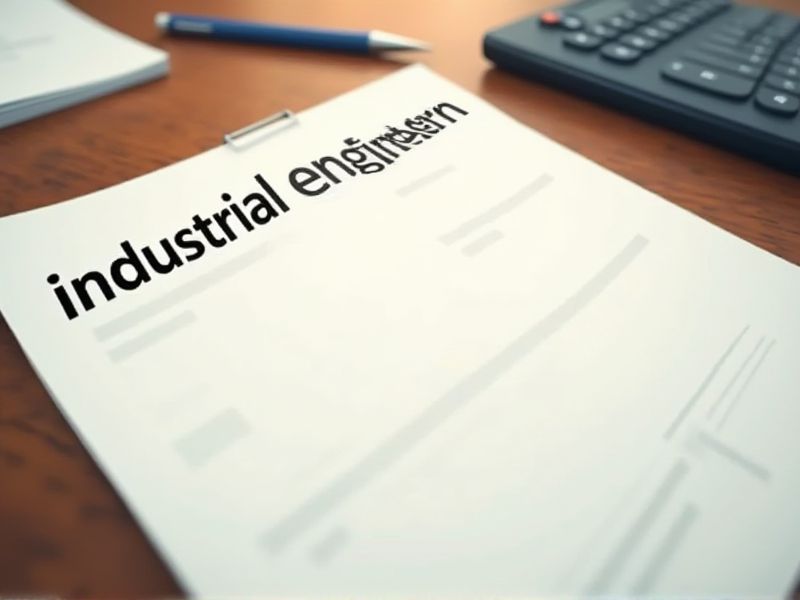
Licensed professional industrial engineers often seek specialized certifications to enhance their skills and remain competitive in the evolving workforce landscape. These certifications provide validation of expertise and demonstrate a commitment to continuous learning and professional development. In industries such as manufacturing, logistics, and supply chain management, certifications often translate into increased opportunities and enhanced credibility. Essential certifications that might be required for a licensed professional industrial engineer include those listed below.
Professional Engineer (PE) in Industrial Engineering
A Licensed Professional Engineer in Industrial Engineering is required to ensure compliance with safety and quality standards during engineering projects. Their expertise enables the effective design and implementation of systems that optimize operational efficiency. Regulatory bodies often mandate the presence of a PE to certify that projects meet technical and ethical standards. The credential adds credibility, enhancing trust with clients and stakeholders in industrial operations.
Certified Industrial Engineer (CIE)
The CIE credential enhances an industrial engineer's credibility in the field by validating specialized expertise and knowledge. With certification, a licensed professional industrial engineer often experiences increased job opportunities and career advancement. Employers prioritize certified engineers as they are perceived to have a thorough understanding of industry standards and best practices. Certification fosters greater trust from clients and stakeholders, particularly in industries requiring high levels of safety and efficiency.
Certified Manufacturing Engineer (CMfgE)
The Certified Manufacturing Engineer (CMfgE) credential ensures advanced technical competence in manufacturing processes, which is essential for licensed professional industrial engineers to optimize production systems. As manufacturing increasingly integrates complex technologies, CMfgE-certified individuals provide a critical bridge between engineering theory and practical application. The certification also signifies up-to-date expertise in lean principles and quality control, enhancing efficiency and product quality. Employers favor industrial engineers with CMfgE certification because it indicates a commitment to ongoing professional development and adherence to industry standards.
Lean Six Sigma Green Belt (LSSGB)
Lean Six Sigma Green Belt (LSSGB) equips industrial engineers with advanced problem-solving skills, enabling them to identify and eliminate inefficiencies in processes. This certification often results in significant cost savings and improved productivity within organizations. The LSSGB credential enhances an engineer's expertise in data-driven decision-making, ensuring optimal resource utilization. As industries increasingly prioritize quality and efficiency, proficiency in Lean Six Sigma methodologies significantly elevates an engineer's ability to contribute to organizational success.
Lean Six Sigma Black Belt (LSSBB)
Achieving a Lean Six Sigma Black Belt (LSSBB) equips licensed professional industrial engineers with advanced problem-solving skills, enabling them to drive process improvements effectively. Expertise in LSSBB allows engineers to reduce waste and enhance efficiency, leading to cost savings and increased productivity in industrial settings. Engineers with LSSBB certification can lead and mentor teams, fostering a culture of continuous improvement within organizations. With the integration of data-driven decision-making, LSSBB-credentialed engineers can align operational processes more strategically with business objectives.
Certified Quality Engineer (CQE)
A Certified Quality Engineer (CQE) enhances a Licensed Professional Industrial Engineer's expertise by focusing on quality systems and their application within industrial operations. The certification helps in improving process efficiencies and reducing waste, thereby aligning with the objectives of industrial engineering. CQEs apply statistical methods to identify and solve quality-related issues, leading to more consistent product quality. Employing CQEs in industrial engineering roles increases a company's potential for continuous improvement and competitive advantage.
Project Management Professional (PMP)
The Project Management Professional (PMP) certification equips licensed industrial engineers with advanced project management skills, crucial for handling complex engineering projects more effectively. A PMP credential signals a standard of excellence recognized globally, which can boost an engineer's credibility and career prospects. As industrial engineering often involves coordinating multifaceted operations, PMP training enhances an engineer's ability to lead teams and manage resources efficiently. In many industries, holding a PMP certification aligns with the increasing demand for professionals who can deliver projects on time and within budget.
Certified Supply Chain Professional (CSCP)
The CSCP certification enhances an industrial engineer's understanding of global supply chain management, which can lead to more efficient production processes. Obtaining CSCP credential equips engineers with advanced knowledge of supply chain logistics, a critical area impacting overall operational costs. It bridges the gap between engineering and supply chain execution, fostering integrated strategies that increase organizational competitiveness. Employers often seek professionals who can blend technical engineering skills with supply chain expertise, making CSCP a valuable asset.
Certified Production and Inventory Management (CPIM)
Certified Production and Inventory Management (CPIM) enhances an industrial engineer's understanding of critical supply chain and inventory management concepts, improving process efficiency. By obtaining CPIM certification, industrial engineers can better align production schedules with demand forecasts, reducing wasted resources. This certification provides crucial knowledge on optimizing inventory levels, minimizing holding costs while maximizing customer satisfaction. CPIM credentials may increase an industrial engineer's credibility, often leading to enhanced career opportunities and professional growth.
Certified Reliability Engineer (CRE)
A Certified Reliability Engineer (CRE) provides specialized skills in designing systems with high reliability, which enhances the efficiency of industrial processes managed by a licensed professional industrial engineer. The CRE's expertise in failure analysis and preventive maintenance helps minimize downtime and reduces operational risks. Industrial engineers can leverage the CRE's insights to implement robust quality assurance measures, leading to better product and system performance. By integrating the CRE's proficiency in statistical reliability methods, industrial engineers can optimize resource allocation and improve overall production throughput.
Summary
By obtaining additional certifications, you enhance your professional credibility and broaden your expertise. This often leads to increased job opportunities and potential for higher earnings in your career. Your ability to handle complex projects and implement innovative solutions can improve significantly. Clients and employers are more likely to trust your skills, fostering better career growth and stability.
